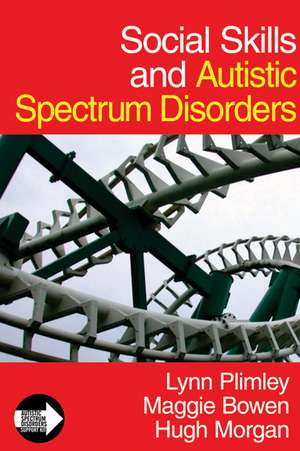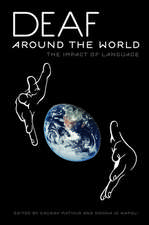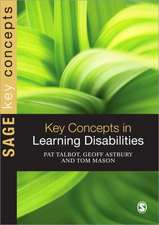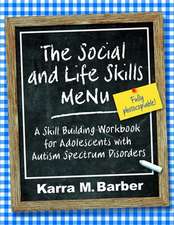Social Skills and Autistic Spectrum Disorders: Autistic Spectrum Disorder Support Kit
Autor Lynn Plimley, Maggie Bowenen Limba Engleză Paperback – 30 ian 2007
`The highly readable, accessible writing style and visually clear presentation allow the reader to dip in frequently to build up knowledge by accretion...This is an excellent book, ideal for those both new to working with people with ASD and also more experienced practitioners' - Special magazine
Individuals with autistic spectrum disorders (ASDs) have difficulty in communicating and socializing. They perceive the world in a very different way to most people, and often find the behaviour of those around them confusing and unfair.
This book examines the concerns around inappropriate social behaviour that those living and working with children and adults face on a day-to-day basis. It discusses preventative measures and intervention strategies, and uses real-life case studies to illustrate these.
Issues covered include:
"an overview of what difficulties might be encountered at different stages in life
"strategies that can be used to alleviate the problems
"how to recognize triggers and create stress-free environments
"hints and tips for those living and working with individuals with ASDs.
Preț: 340.19 lei
Preț vechi: 358.09 lei
-5% Nou
Puncte Express: 510
Preț estimativ în valută:
65.10€ • 68.10$ • 54.08£
65.10€ • 68.10$ • 54.08£
Carte tipărită la comandă
Livrare economică 03-17 aprilie
Preluare comenzi: 021 569.72.76
Specificații
ISBN-13: 9781412923132
ISBN-10: 1412923131
Pagini: 96
Dimensiuni: 156 x 234 x 8 mm
Greutate: 0.18 kg
Ediția:1
Editura: SAGE Publications
Colecția Sage Publications Ltd
Seria Autistic Spectrum Disorder Support Kit
Locul publicării:London, United Kingdom
ISBN-10: 1412923131
Pagini: 96
Dimensiuni: 156 x 234 x 8 mm
Greutate: 0.18 kg
Ediția:1
Editura: SAGE Publications
Colecția Sage Publications Ltd
Seria Autistic Spectrum Disorder Support Kit
Locul publicării:London, United Kingdom
Cuprins
1. The Impact of an Inabilty to Interact and Communicate socially- the Triad of Impairments, causation and manifestation of inappropriate behaviour.
2. Ages and Stages- an overview of what issues might be encountered at different stages in the life cycle
3. Overview of Current Research – what strategies have been used to alleviate the problems
4. Analysing Behaviour- what is needed and what can be discarded – how to prioritise- and tackle the real issues, behaviours that cause offence but no physical harm
5. Avoidance Tactics for Anti-Social Behaviour- recognising triggers, creating the stress-free environment, using the right language, case studies of avoidable anti-social behaviours
6. Positive Role Models- Social support groups, using role play, PSHE, giving individuals with ASD a role and a responsibility
7. Preventing Criminal Behaviour- the extent of the problem, the role of the Youth Justice System (assessment, procedures, partnership with schools), preventative measures at school and at home
8. Keeping a Record- using self reports, personal portfolios monitoring behaviour, emphasising strengths, working with outside agencies, careers service and employers to promote a positive image
9. Realistic Expectations- seeing the behaviour and the issue in the context of ASD, getting the balance right, avoiding breakdown, the home environment, the school environment, out and about in society.
10. How to Help- hints and tips for those living and working with individuals with ASD
2. Ages and Stages- an overview of what issues might be encountered at different stages in the life cycle
3. Overview of Current Research – what strategies have been used to alleviate the problems
4. Analysing Behaviour- what is needed and what can be discarded – how to prioritise- and tackle the real issues, behaviours that cause offence but no physical harm
5. Avoidance Tactics for Anti-Social Behaviour- recognising triggers, creating the stress-free environment, using the right language, case studies of avoidable anti-social behaviours
6. Positive Role Models- Social support groups, using role play, PSHE, giving individuals with ASD a role and a responsibility
7. Preventing Criminal Behaviour- the extent of the problem, the role of the Youth Justice System (assessment, procedures, partnership with schools), preventative measures at school and at home
8. Keeping a Record- using self reports, personal portfolios monitoring behaviour, emphasising strengths, working with outside agencies, careers service and employers to promote a positive image
9. Realistic Expectations- seeing the behaviour and the issue in the context of ASD, getting the balance right, avoiding breakdown, the home environment, the school environment, out and about in society.
10. How to Help- hints and tips for those living and working with individuals with ASD
Descriere
This book examines the concerns about inappropriate social behavior sometimes exhibited by individuals with autistic spectrum disorders (ASD) and offers tips and strategies for alleviating problem situations.

















